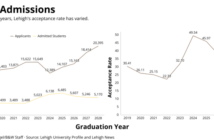
Peter Gormley
If you ask alumni who graduated from Lehigh before 2000 what their fondest memories are, many will recall their time spent on the Hill.
While Greeks still live on the Hill, non-registered parties have been forced off-campus to Hillside and East Fifth. As of a week ago, even off-campus parties are becoming non-existent in light of the Lehigh University and Bethlehem police departments’ zero-tolerance underage drinking policies. The police are breaking up parties and citing underage students more than ever before.
I sympathize with the fact that the LUPD and BPD are put in a tough position. Their No. 1 priority is to keep Lehigh students safe. Overall, they are doing their job and doing it well.
That being said, I believe this zero-tolerance policy is a short-term solution to a long-term problem. Let’s face it: whether we like it or not, underage drinking is happening and will continue to happen at Lehigh and college campuses across the country.
Instead of shutting down parties and citing students, the LUPD, the administration and all students should focus our energy on promoting safety, inclusivity, and of course, fun.
I believe bringing parties back to the Hill will accomplish this goal.
Back in the day, students hopped house-to-house on Friday and Saturday nights. It was an inclusive culture with open parties — it didn’t matter if you were in a fraternity or sorority, you could go wherever you liked.
Parties were held in large rooms equipped to safely host large numbers of people, and members controlled alcohol distribution through a bar. If you go to an off-campus party today, you’ll find dark basements with seven-foot ceilings. There’s usually no room for a bar, and the houses are so small that you can’t move around and socialize.
Fraternities generally only invite one other group or organization and cannot open their house to the rest of the Lehigh community due to lack of space.
Off-campus houses are not safe either. From broken staircases to shattered floor boards, these houses are not equipped to host 200 dancing college kids. This is often a recipe for a fire hazard.
The residents living near these party locations are not often part of the Lehigh student body, which can put both the South Side and Lehigh communities in danger. The local community should not need to be exposed to loud parties at late hours of the night.
So, is it possible to bring parties back to the Hill?
Last year, LUPD, the Office of Fraternity and Sorority Affairs and the Interfraternity and Panhellenic councils met to organize multiple “Epic Party Weekends” on the Hill. Epic Party Weekend events were hosted on Friday or Saturday nights, and a few fraternities were allowed to host parties on the Hill with restrictions.
At registered parties, fraternities are limited to a certain number of cases of beer, usually five to 10. Within 20 minutes, the beers are gone. The case limit is not reasonable.
Two security guards must also be at the party at all times. The fraternities are responsible for monitoring the parties, but a group of student affiliates and security guards also walk from party to party to make sure the organizations are following the rules.
These restrictions ensure that students would be more likely to go off-campus than deal with the Hill.
For future Epic Party Weekends, OFSA agreed fraternities could have a more reasonable case limit depending on the size of their party room.
The party weekends were not perfect, which was expected, but were mostly considered a success and something that could be improved in the future. The weekends fostered inclusivity with many Greek and non-Greek students.
Although a couple of citations were issued, students remained safe — and of course, it was a good time.
Things were looking positive until fraternity recruitment started last year. With increasing hospitalizations and hazing violations by fraternities, OFSA put an end to Epic Party Weekends to focus on other issues.
While I understand the administration’s frustrations, I believe off-campus hospitalizations offer even more incentive to bring parties back on the Hill. Lehigh can monitor the parties and ensure that students remain safe. If a student needs medical attention, LUPD has access to all the Greek houses — OFSA also requires fraternities to provide water and food for attendees so they have an alternative to drinking.
When fraternities are given the opportunity to have parties on campus, they follow the rules and expectations set forth by the university. I believe that parties on the Hill would be a step in the right direction for Lehigh’s social scene. Students see a need for change, and now is the time to make that change.
Lehigh has a long history of producing professionals who are intelligent and value personal connections. This stems from the “work hard, play hard” mentality that often translates well into the workforce.
Employers target Lehigh students for that reason. We must maintain the social scene that makes this school, and the students who go here, so unique and well-rounded.
—
Peter Gormley, ’18, is an associate data editor for The Brown and White. He can be reached at [email protected]





Comment policy
Comments posted to The Brown and White website are reviewed by a moderator before being approved. Incendiary speech or harassing language, including comments targeted at individuals, may be deemed unacceptable and not published. Spam and other soliciting will also be declined.
The Brown and White also reserves the right to not publish entirely anonymous comments.
8 Comments
Concur with this concept & fraternity juniors & seniors need to move back into the houses to provide leadership in fraternities. The off-campus flight has injured both the University & Bethlehem community & weakened fraternity leadership.
got to Lehigh the spring of ’78…….an amazing time to be a Lehigh student. the parties at Delta Upsilon were amazing. I used to think of The Hill as the perfect atmosphere and environment for some fun. of course, it also came with some responsibility and it taught people how to behave and socialize in an acceptable manner. too bad we live in an age of litigation and all the policies (social) that have been implemented are to prevent Lehigh from being liable.
Use of alcohol is a privilege granted to individuals to be used responsibly. The assumption is that those 21 and over will act responsibly. Obviously not a valid assumption. As an educational institution, Lehigh has the task of educating its students. Underage drinking has been a part of that education, probably from 1865. Responsibility is also a part of that education. Using alcohol responsibly is a worthwhile goal for the university.
If drinking and partying mean so much to current Lehigh students, they need to do so responsibly, on their own or with help of friends.
1. “When fraternities are given the opportunity to have parties on campus, they follow the rules and expectations set forth by the university.”
2. “Things were looking positive until fraternity recruitment started last year. With increasing hospitalizations and hazing violations by fraternities, …”
Quote 1 says: We are responsible.
Quote 2 says: We are responsible but not all the time.
This article seems to argue that drinking and parties are rights that Lehigh students have always had and should continue to have. It seems to me as though a privilege has been abused and thereby limited by the granting authority. In the 1960’s the university moved off campus fraternities onto campus.
Have fun and party but act responsibly Mountain Hawks.
One cannot learn to drink responsibly or to party respectfully if the drinking is forced underground. I’ve heard that because Lehigh has basically closed the Hill (where there used to be wine and cheese parties, cocktail parties where attendees wore jackets and ties and dresses, fun theme parties, etc.) kids now do huge quantities of shots in their dorms to “pregame” (because they are underage and can’t get served) or they head down to an off-campus apartment with rickety construction and lurking BPD cops just waiting to swoop in for the but. The neighbors can’t be thrilled. Someone is buying that liquor for them–are they putting themselves risk?
Back in the late 1970s, early 1980s, we helped kids who over-imbibed without fear of reprisal. We learned how much was too much for us. Problems occurred, to be sure, but the LU community seemed to take care of things on its own. You learn from mistakes. You learn from having a nice cocktail event with actual conversations, and those huge beer parties–well I figured it took 20 minutes to stand in line to get a beer, then 20 minutes to wait in line at the “ladies room”, only to start the process over again. Do this three or four times and the night is gone! There was an ebb and flow to the alcohol that age kids time to figure out what their bodies could handle.
My older son went to a small midwestern liberal arts college and its quiet policy was that as long as you were quiet, respected your neighbors needs, and didn’t end up in the hospital or wandering off campus (off-campus is bad because you are likely to encounter town cops), the school trusted you to make good choices. By and large the kids did make good choices. Not nearly the town/gown issues, no big busts of parties, kids learned the right way to drink and care for themselves. The invited college president invited seniors to happy hours. Civilizing the process would be a teaching moment for LU underclassmen. Especially since many kids are coming from states where it is illegal for parents to serve even a glass of wine with Thanksgiving dinner–they arrive with little or no experience in social drinking, in setting limits, etc.
The huge new LU police station posed right on the border of off and on campus, is to me, a sign that the campus cops and BPD are not yet ready to handle the issue in a sensible manner–they’ve got mounted police, undercover cops, drones. Not an attractive message potential students and their parents, IMHO.
Bring back the Hill but do it sensibly.
Enacting more severe consequences will surely quell the collegiate appetite for drink, right?
The author makes some valid points, and I certainly agree that it is not fun nor useful to attend a university that does not seem to show clear trust and faith in its students. Lehigh does have a good way to go to demonstrate that it truly wants students to use this campus (their home), and that it trusts the majority of them to make decent or good choices, and also that it is committed to really counter-programming the party scene.
What I am curious about is why, in everything I read on this subject, it seems to be a tenet of fact that “college students are going to drink, so…” Why is this something that we cannot evolve from? To me, it’s analogous to saying “welp, white people are always going to be racist, so…” or “well, men are always going to oppress women, you can’t stop them from doing it, so you shouldn’t bother trying…” I know that there are people who hold these views, who simply give up on humanity’s ability to evolve to new knowledge and new values systems. But I don’t – I’ve been on this earth a little over 40 years, and I have seen plenty of examples where a majority of people get together and decide that something needs to change, because there is a harm being done, so we’re going to change it. Or at least move things in the direction of that change, rather than further toward the abyss.
I would argue that there is a pretty clear social harm here, in that “college students are going to drink” very quickly becomes “college students are going to drink far beyond excess in a single-focused effort to get blackout, blind, beyond drunk and we’ll just see what happens next.” Even if you do take that first statement as a given fact for all time (which I don’t), isn’t it a pretty big leap from there to here? Is it really the case that if Lehigh parties moved back to the Hill, they would become instances of responsibility where no one would act out of line or worse, use alcohol as an excuse to enact all the sad, scary impulses and fears that they have in everyday life but don’t know what to do with? Would putting parties “back on the Hill” really accomplish that? If not, then there is a larger issue at play.
Finally: I had a fabulous four years as an undergraduate college student (not at Lehigh – I attended a small, midwestern liberal arts university). I have great affection for my alma mater. I keep up with the news from there, and occasionally I even donate a small amount to them, as a symbolic gesture of support. I was in a fraternity, and although mine did not specialize in Wall Street connections, I had many good friends (and good times) there. But I would not conceive of the expectation that students who attend my alma mater today should relive my college years in any way, shape, or form. Lord, I hope they don’t. Generations get smarter – and sometimes, newer generations need to look at the older ones and say “sorry, we’re glad you did X and enjoyed it, but we are going to move on now and do things differently.” This, I think, should be one of those cases. In other words, I really don’t care what this institution was like for students who attended it in 1961 or 1976 or 1985 or 1995 or even 2009 or even 2016. Someone has to break the chain which rewards the behavior of excessive escapism through alcohol or drugs, and decide to spend their time on this earth doing more useful things. Which might even involve alcohol, drugs, or other forms of experimentation, escapism, play – but doesn’t simply replay a tired narrative that isn’t doing anything to move our community forward.
I’m sorry Bill but this comment is bathed in hypocrisy. You’re calling on a generation of 18-22 year olds to make better decisions than you did as an 18-22 year old (yet it is scientifically proven young people are prone to risk taking and poor decision making). How is it fair to move the goalposts on this generation of kids and expect them to be more mature when it is proven their brains are not fully developed? Why weren’t you the change you’re now calling for? It’s easy to throw burdens of societal change on the youngest in society while washing your own hands and saying “opps I hope no one acts like I did in college.” If this is something you are truly interested in, why not engage in nonprofit work or put your money where your mouth is?
Bring back the Hill! Let my people party!